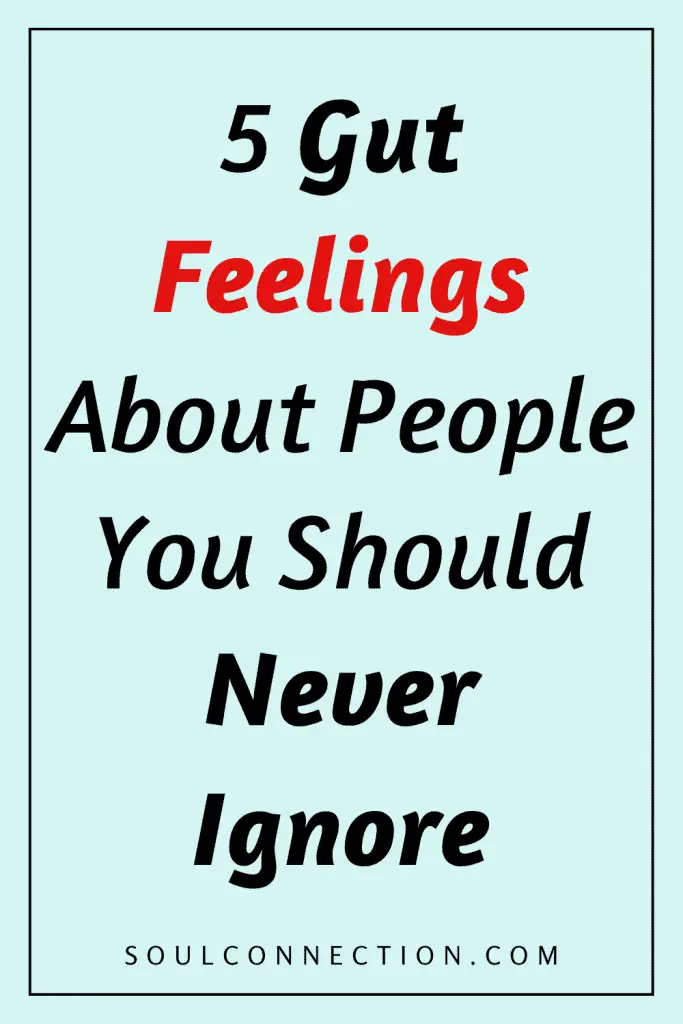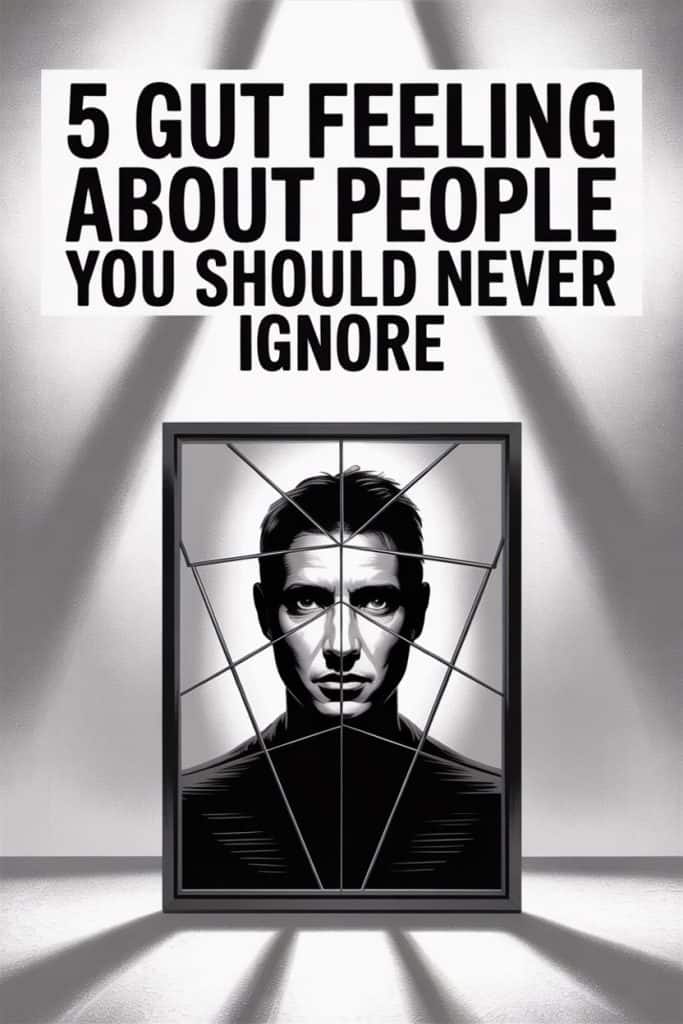Ever met someone whose smile is a little too wide or whose compliments feel like they’re wrapped in razor wire? If your answer is “Yes, and I married him,” well, pull up a chair.
Our instincts are ancient little creatures—think of them as the nosy neighbourhood granny living in the basement of your brain, peeking through the curtains at every stranger you bring home.
Sometimes, she’s wrong (sorry, Gran), but more often than not, she’s bang on.
Curious why you get that tingle down your spine or why your stomach drops when someone walks into the room? Here’s your cheat sheet.
Five gut feelings about people that you should treat like the “Wet Paint” sign at a dodgy public loo—heed them, or risk walking away worse off.
1. That Shifty Feeling When Someone’s Words Don’t Match Their Actions
We’ve all had that friend who swears they’re “five minutes away”—while their Instagram shows them still at home, face-deep in a Deliveroo order.
But when it comes to relationships, spotting this mismatch between words and actions is less funny and more “red flag waving at Glastonbury” alarming.
If someone’s declaration of love or friendship comes with grand gestures but their day-to-day behaviour feels hollow, your suspicion isn’t a quirk. It’s a signal.
Consistency is the secret handshake of trust: genuine people make their actions and words play on the same team.
When someone’s mouth is pitching for Manchester United, but their feet are running for Liverpool, it’s not just confusing—it’s a warning.
Trust what you see, not just what you hear. If your gut whispers, “Something doesn’t add up,” don’t shush it with wishful thinking. Start noticing the pattern.
Are you constantly making excuses for them? Is their behaviour always two steps behind their promises? There’s your answer.
2. That Prickly Sensation When Someone Seems Too Nice, Too Fast
If someone you’ve just met insists you’re destined to be best mates, soulmates, or the next viral TikTok duo after two margaritas, pause before you send them your Netflix password.
That giddy rush can be fun (who doesn’t like feeling adored?), but love bombing and excessive flattery are the bread and butter of people who want to bulldoze boundaries.
Real relationships—romantic or platonic—build at a natural pace.
If you’re being showered with affection, gifts, or intense confessions before you’ve even swapped last names, ask yourself: is this genuine, or am I being auditioned for a role in their drama?
Your gut is excellent at sniffing out when it’s all too much, too soon. If you find yourself feeling pinned by their attention rather than cherished, don’t write it off as commitment-phobia.
Sometimes, the only thing blossoming faster than their compliments will be your regret.
3. That Unsettling Quiet When Someone Never Admits Fault
Everyone knows someone who could trip over a coffee table, knock over a lamp, and still find a way to blame the furniture. Fun at parties; nightmare in relationships.
If your gut clenches every time you try to raise an issue, because experience tells you it’ll be spun back on you, listen up.
Chronic deflectors—those who refuse to say sorry or admit they’re ever wrong—are tougher to be around than your nan’s overcooked Christmas turkey.
Trust isn’t built on perfection; it’s built on accountability. When someone can’t own their mistakes, it’s a sign your needs and feelings might be getting left at the door.
If your stomach is in knots after every “discussion,” or you leave conversations feeling gaslit, manipulated, or like you’ve just finished a round with a very passive-aggressive boxer, don’t ignore it.
Healthy people admit when they’re wrong, apologise, and learn from it. If you’re always the one extending the olive branch (or the whole tree), your intuition’s right: this isn’t just a bad day; it’s a bad pattern.
4. That Icy Chill When Someone’s Energy Drains the Room
Some people walk in and the whole room feels lighter. Others arrive and it’s as if someone’s set off the world’s most depressing air freshener.
If you regularly feel exhausted, anxious, or just plain down after spending time with a particular someone, don’t chalk it up to low blood sugar.
Emotional vampires aren’t the stuff of cheap horror flicks—they’re real, and they hide in plain sight. These are the folks who seem to suck the joy, optimism, and sometimes your will to live, right out of you.
They constantly criticise, one-up, or play the victim, and somehow your problems always become about them.
If your gut is telling you to limit your time or put up boundaries, that’s not selfishness. It’s self-preservation. Not everyone deserves VIP access to your time and energy.
The right people will leave you feeling seen and safe, not like you need a nap, a shower, and possibly a new therapist.
5. That Nagging Discomfort When Someone Makes You Doubt Yourself
Ever been with someone who makes you second-guess your own memories, feelings, or even your sanity? (“Did I really say that? Am I overreacting? Wait—was it Tuesday or Thursday?”) Congratulations, you’ve met a gaslighter.
Gaslighting isn’t just for political debates or true crime podcasts. It’s right there in toxic relationships, subtle but insidious.
If you leave conversations questioning your reality, or feel like you’re walking on eggshells, your gut is working overtime.
Healthy relationships, at their core, help you know yourself better. The wrong ones will have you doubting your every move. If your inner voice is sending up distress signals, don’t silence it.
Anchor yourself in your own memory, trust what you feel, and reach out for perspective from people who see you clearly.
Listening to Your Gut Without Becoming a Suspicion Machine
Here’s the kicker: our instincts aren’t just evolutionary leftovers—they’re fine-tuned alert systems designed to keep us safe.
But that doesn’t mean you need to treat every new acquaintance like an undercover supervillain. Sometimes, a funny feeling is just nerves or an off day.
The trick is to balance intuition with reflection. If a gut feeling keeps cropping up and the evidence stacks up, it’s time to act. Set boundaries, ask questions, and if needed, distance yourself.
Trust doesn’t mean being naïve; it means listening to both your head and your heart—then letting your gut cast the tie-breaking vote.
Relationships should feel safe, energising, and yes, sometimes challenging, but never like an endless episode of “Who Wants To Be Gaslit?”
If your stomach’s screaming for your attention, don’t drown it out with logic or wishful thinking. That ancient granny in your brain? She’s seen a few things. It’s worth listening.
Keep your instincts on speed dial. They’re usually right, and when they’re not, at least you’ll have a great story to tell.


